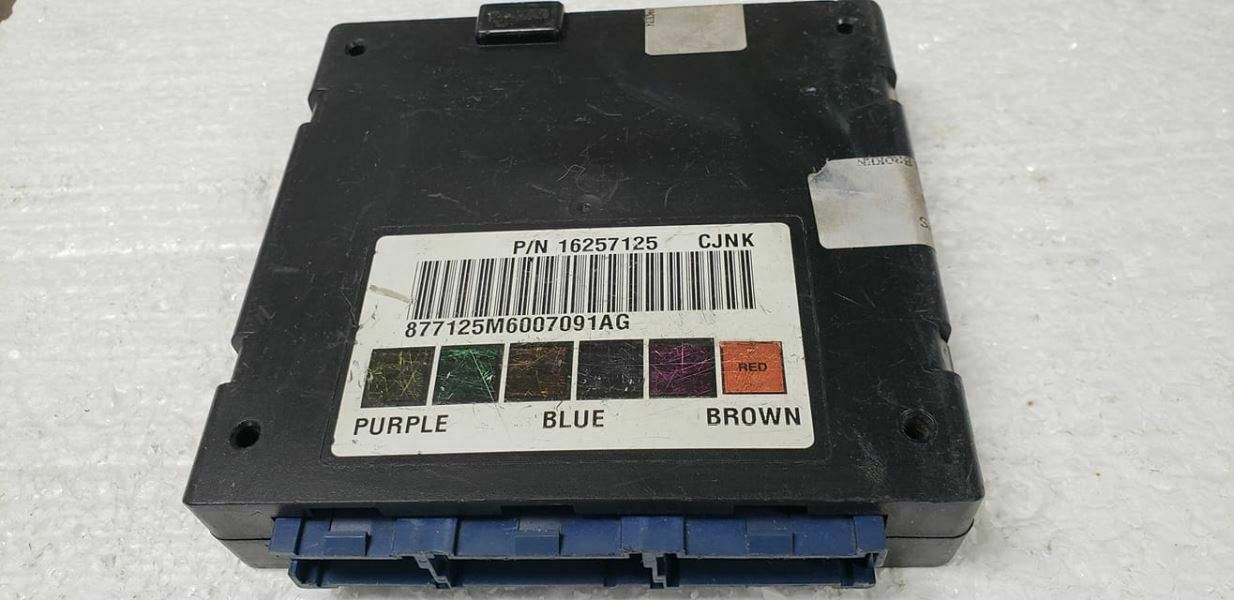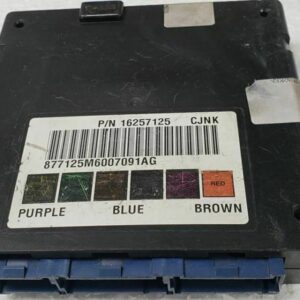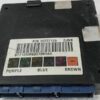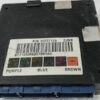Restore Your Truck’s Electrical System with a Reliable, Programmed BCM
Are you chasing down electrical gremlins in your late 90s or early 2000s GM truck or SUV? Flickering lights, a dead instrument cluster, power windows with a mind of their own, or a security light that prevents your engine from starting are all classic signs of a failing Body Control Module (BCM). As a technician with over two decades of experience, I’ve seen how a faulty BCM can turn a dependable vehicle into a source of constant frustration. The BCM is the central hub for your vehicle’s body electronics, and when it fails, it creates a cascade of bizarre, seemingly unrelated problems.
This isn’t just a replacement part; it’s a complete solution. We take the guesswork and high costs out of the repair by programming this 1999-2000 GM BCM directly to your vehicle’s VIN before it ever leaves our facility. This means you get a module loaded with the latest GM software updates, tailored specifically for your truck. You avoid a costly trip to the dealership for programming, saving you time, money, and the headache of towing your vehicle. It’s the most direct path to getting your truck’s essential functions back to factory-spec reliability.
A Technician’s Notebook: The Case of the Haunted Silverado
A customer brought in his ’99 Silverado 1500 with a list of complaints that sounded like something from a ghost story. The dome light would randomly turn on while driving, the radio would shut off, and worst of all, the anti-theft system would occasionally immobilize the truck. He’d already replaced the battery and checked grounds. After plugging in my scan tool, I saw multiple communication loss codes with various modules. This pointed directly to the BCM. The internal logic board had developed micro-fractures in the solder joints from years of heat cycles and vibration, causing intermittent connections. Installing a pre-programmed BCM like this one solved every single issue in one go. It’s a common failure I’ve fixed hundreds of times on these otherwise rock-solid trucks.
Is Your Truck Showing These Symptoms?
- ✔ Erratic or non-functional power windows, locks, and mirrors.
- ✔ Interior dome lights staying on or not working at all.
- ✔ The security or anti-theft light is illuminated, causing a no-start condition.
- ✔ Instrument panel gauges behaving erratically or going dark.
- ✔ Horn honking unexpectedly or not working when pressed.
- ✔ Communication loss DTCs (Diagnostic Trouble Codes) like U1000 or similar.
- ✔ Inconsistent operation of the heating and A/C blower motor.
A Straightforward Guide to Your BCM Installation
Replacing the BCM is a manageable job for a DIYer with basic tools. The most important part is getting a module that’s already programmed, which we handle for you. Just provide your VIN at checkout.
- Safety First: Disconnect the negative terminal from your vehicle’s battery to prevent any electrical shorts.
- Locate the BCM: On most of these models, the BCM is located under the driver’s side of the dashboard, often to the left of the steering column. On some S-series trucks, it may be in the center dash area. A quick search for your specific model will confirm the location.
- Remove Trim Panels: You will likely need to remove the lower dash panel (kick panel) to gain access. These are typically held on by a few screws and clips.
- Disconnect and Remove: Carefully unplug the electrical connectors from the old BCM. They have locking tabs that need to be depressed. Once disconnected, unbolt the module from its mounting bracket.
- Install the New BCM: Mount your new, pre-programmed BCM in place and securely fasten it. Reconnect all the electrical connectors, making sure they click into place.
- Final Steps: Reinstall any trim panels you removed and reconnect the negative battery terminal.
Important Post-Installation Information
After installing your new 1999-2000 GM BCM, your vehicle may require one or more simple relearn procedures. This is a normal part of the process as the new module syncs with your truck’s other systems.
- Airbag System Sync: If you see an airbag warning light on your dash after installation, a professional scan tool is needed to perform the “Setup SDM Primary Key in BCM” procedure. This syncs the BCM with the airbag module (SDM) and is only necessary if the light appears.
- Brake Pedal Position Relearn: On some models, a brake pedal position sensor recalibration might be needed to ensure your brake lights and traction control system function correctly. This can often be done with a capable bidirectional scan tool.
Disclaimer: Vehicle systems vary. Always have a factory service manual for your specific model on hand for detailed instructions and diagrams. If you are unsure about any step, we recommend consulting a qualified professional mechanic.
Verified Vehicle Compatibility
This module is a direct-fit replacement for the following vehicles and part numbers. It is compatible with part numbers 19153625, 8191536250, 16257125, 191583625, 8093668010, 8162571250, and 09366801.
- Astro Van: 2000 (LH dash)
- Blazer S10 / Jimmy S15: 1998-2000 (center dash, ID 16257125)
- Bravada: 1998 (center dash, w/extended build date opt ZN4)
- Isuzu Hombre: 1999-2000 (LH dash)
- S10 / S15 / Sonoma Pickup: 1998-2000 (center dash, ID 16257125)
- Safari (GMC): 2000 (LH dash)
- Sierra 1500/2500 Pickup: 1999-2000 (LH dash)
- Silverado 1500/2500 Pickup: 1999-2000 (LH dash)
Frequently Asked Questions
How does the programming process work?
It’s simple! After you complete your purchase, just send us your vehicle’s 17-digit VIN. Our technicians will then program the BCM with the latest official GM software specific to your truck before we ship it. This ensures it’s ready for installation right out of the box.
Do I need to send my old BCM back?
No, there is no core charge for this part. You can keep your original module, which can be helpful for comparison or as a backup.
Will this fix my “Service 4WD” light?
While a faulty BCM can cause a variety of issues, the “Service 4WD” light is more commonly related to the Transfer Case Control Module (TCCM) or the encoder motor on the transfer case. It’s best to have the vehicle scanned for specific codes before ordering.
What tools do I need for the installation?
For most of these trucks, you’ll only need basic hand tools like a socket set and a screwdriver or trim panel removal tool. No special programming tools are required from your end since we handle that part.
Is this a guaranteed fix for my problem?
This programmed 1999-2000 GM BCM is a direct solution for failures within the module itself. If your vehicle’s symptoms match the common failure points listed, it is the most likely solution. However, we always recommend proper diagnostics to rule out wiring or sensor issues first.



